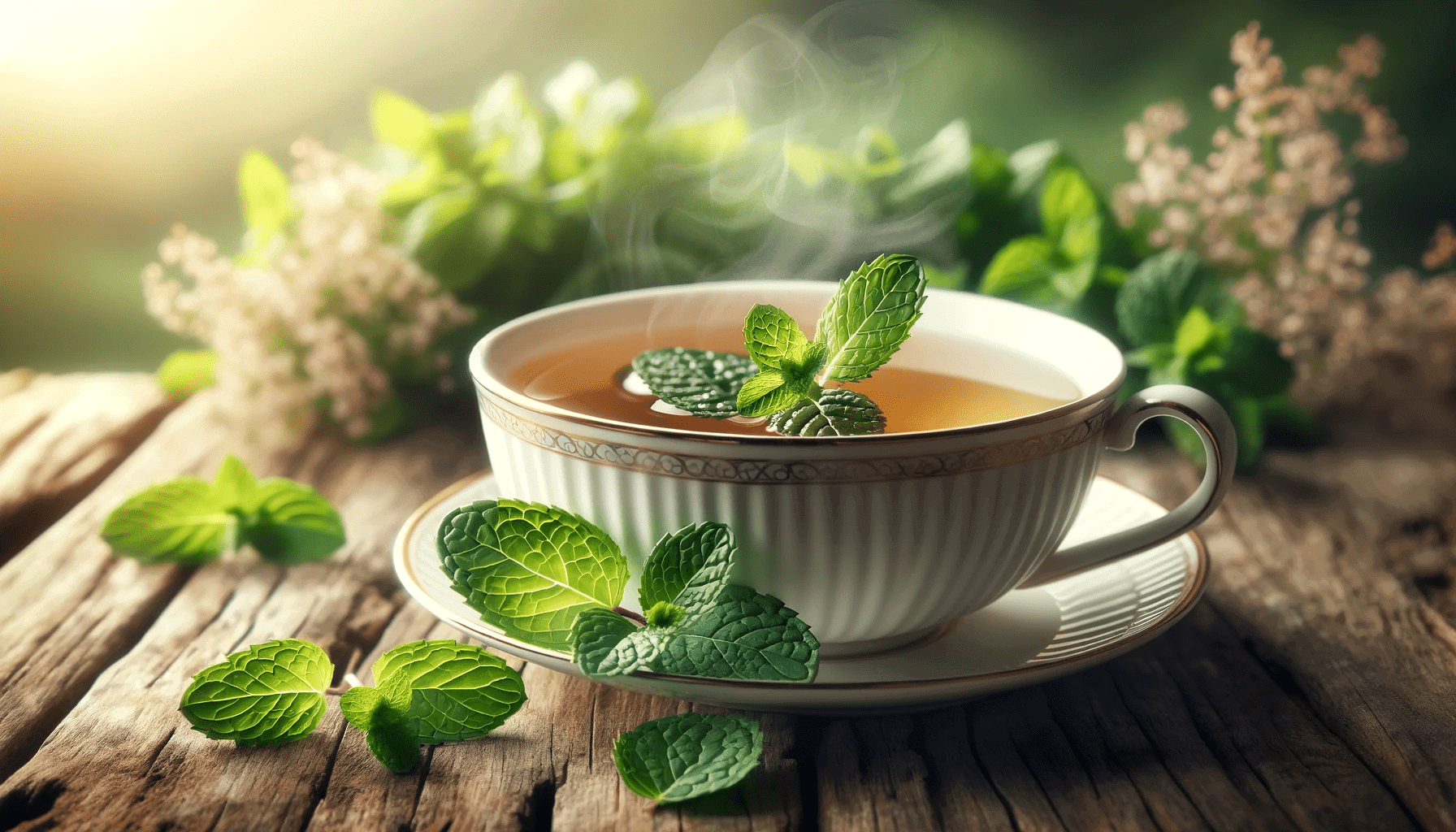From bloating to indigestion, there’s a variety of tea that helps with digestion. The right blend can stimulate digestion, reduce gas, and even help your body absorb nutrients more efficiently. Let’s explore which teas you should be sipping on for a happier, healthier gut.
How Tea Can Help Improve Digestion
When you’re dealing with uncomfortable digestive issues, reaching for a warm cup of tea might be more than just a comfort ritual—it could be a remedy. The connection between herbal teas and digestive health is backed by both centuries-old wisdom and modern science. Let’s delve into the specific types of teas that can help and the benefits they offer for digestion.
Types of Tea That Helps With Digestion
Firstly, peppermint tea is a go-to for digestive discomfort. It’s known for its soothing properties and the ability to relax the muscles of your digestive system, which can help reduce symptoms of bloating and gas.
Then, there’s ginger tea—a potent ally against nausea and indigestion. It encourages the production of digestive enzymes, which can speed up the process of moving food through your stomach.
Chamomile tea is another digestive aid, particularly celebrated for its anti-inflammatory effects that can ease an upset stomach. It also helps to calm the digestive tract, improving digestion.
- Peppermint Tea: relieves bloating and gas
- Ginger Tea: enhances digestive enzymes
- Chamomile Tea: calms upset stomach
For those interested in less commonly known options:
- Fennel tea can help relax the digestive tract muscles and offers relief from cramping.
- Licorice root tea is often used to soothe gastrointestinal problems due to its anti-inflammatory and immune-boosting properties.
Benefits of Tea for Digestion
Drinking the right tea that helps with digestion is not the only benefit. Here are some of the things you can expect:
- Stimulates Digestion: Certain teas increase saliva and stomach acid production, helping break down food more efficiently.
- Reduces Inflammation and Cramping: Anti-inflammatory properties in teas can relieve discomfort from cramping.
- Improves Nutrient Absorption: By promoting a healthy digestion process, these teas ensure better nutrient uptake by the body.
- Decreases Bloating: Teas like peppermint help to dissipate gas and reduce bloating, creating a more pleasant digestive experience.
Remember, while tea can be a beneficial part of your digestion-aiding toolkit, it’s essential to pair these practices with a balanced diet and healthy lifestyle choices for the best results. Incorporating these teas into your routine could lead to noticeable improvements in digestive health and, as a result, elevate your overall sense of wellbeing.
Best Tea That Helps With Digestion
Peppermint Tea
When you’re experiencing digestive discomfort, peppermint is typically considered the best tea that helps with digestion. Menthol, the main component in peppermint leaves, is the power player here. It’s not just a fresh flavor; it relaxes your digestive system and can ease pain from gas and bloating. But that’s not all; peppermint tea also has a knack for stimulating bile flow, which allows your body to digest fats more efficiently.
Ginger Tea

Another heavyweight that helps digestion is ginger tea. This spicy brew comes packed with gingerol and shogaols, compounds that are known for their anti-inflammatory and digestive benefits. Whether you’ve overindulged at the dinner table or you’re dealing with nausea, ginger tea can help settle your stomach. By speeding up the emptying of the stomach, it ensures you won’t feel bogged down after meals.
Chamomile Tea
Lastly, there’s chamomile tea. This gentle herbal infusion is famous for its calming properties. But did you know it’s also fantastic for digestion? Chamomile can soothe the muscles that line your digestive tract, making it a helpful ally in reducing the symptoms of irritable bowel syndrome (IBS) and gastritis. It’s like a warm hug for your tummy, helping to reduce cramping and act as an anti-inflammatory. Plus, if stress is messing with your digestion, chamomile tea’s stress-relieving properties can serve as a two-for-one solution, promoting relaxation while aiding gastrointestinal comfort.
How to Prepare Tea
Brewing Methods
When you’re looking to enhance your digestion through tea, brewing it correctly is key for full effectiveness. Steeping time directly influences the concentration of beneficial compounds in your tea. Peppermint tea should steep for 5-10 minutes to extract its digestive properties, while ginger tea benefits from a longer time of about 10-15 minutes to ensure all the potent flavors and medicinal properties are released. For chamomile tea, steeping for about 5 minutes is often enough to obtain its calming effects.
The water temperature also plays a role in the extraction process. Ideally, use water that’s just below boiling to preserve the delicate essential oils in herbs like chamomile and peppermint. Ginger, on the other hand, stands up well to boiling water, which helps to release its powerful components.
Adding Other Ingredients for Maximum Benefit
To optimize the digestive benefits of your tea, consider adding other ingredients. A drop of honey or a squeeze of lemon can not only enhance flavor but also provide additional health benefits. Honey can soothe the throat and has antibacterial properties, while lemon juice adds a boost of vitamin C and can help to cleanse your digestive system.
You might also explore combining different teas to create a blend specially tailored for digestion. For example, merging ginger and peppermint teas can offer a powerful duo to alleviate digestive discomfort. Adding sliced fresh ginger to your brew can intensify the anti-inflammatory benefits, while fresh mint leaves can add a more potent flavor and additional soothing effects for your stomach.
Remember, the best teas for digestion are not only about what you choose but how you prepare them. Steep times, water temperature, and additional ingredients all impact the overall ability of the tea to support your gastrointestinal health. Happy brewing and enjoy the natural, calming influence these teas can have on your digestive system.
Tips for Incorporating Tea into Your Digestive Health Routine
Best Time to Drink Tea for Digestion
When you’re aiming to improve digestive health with tea, timing is key. Drinking a warm cup of tea before a meal can help prepare your digestive system for the food you’re about to consume. The warmth stimulates digestion and can increase the production of digestive juices. If you prefer drinking tea after your meal, wait for about 30 minutes to avoid interfering with your body’s natural iron absorption. For those who experience occasional bloating or indigestion, a cup of tea before bedtime may soothe your stomach and promote a more restful sleep.
Frequency of Tea Consumption
Moderation is essential when incorporating tea into your digestive routine. Aim for about 1-3 cups daily to experience the benefits without overdoing it. Too much of any tea, even those known for aiding digestion, can lead to negative side effects like dehydration or stomach discomfort. Pay attention to your body’s response and adjust your intake accordingly. Keep in mind that certain teas, especially those containing caffeine, should be consumed earlier in the day to avoid any potential sleep disturbances.
Other Lifestyle Factors to Consider
While tea is a fantastic addition to your digestive health arsenal, it’s vital to consider it as part of a broader holistic approach. Ensure that you’re also:
- Eating a balanced diet high in fiber
- Staying hydrated with water throughout the day
- Engaging in regular physical activity
- Managing stress levels, as stress can significantly impact digestion
Combining the digestive benefits of tea with these healthy practices can lead to more significant improvements in your overall well-being. Remember to occasionally switch up the types of tea you drink to find which best suit your needs and preferences.
Conclusion
You’ve got the scoop on the top teas for digestion—peppermint, ginger, and chamomile. Remember to sip smartly before meals to kickstart your digestive process and hold off for a bit post-meal to maximize nutrient uptake. Stick to 1-3 cups a day to keep things balanced. And don’t forget, your overall lifestyle plays a pivotal role in digestive wellness. So eat well, stay active, and manage stress to complement your tea-drinking habits.
References:
Xia, X., Lin, Z., Shao, K., Wang, X., Xu, J., Zhai, H., Wang, H., Xu, W., & Zhao, Y. (2020). Combination of white tea and peppermint demonstrated synergistic anti-bacterial and anti-inflammatory activities.. Journal of the science of food and agriculture.


